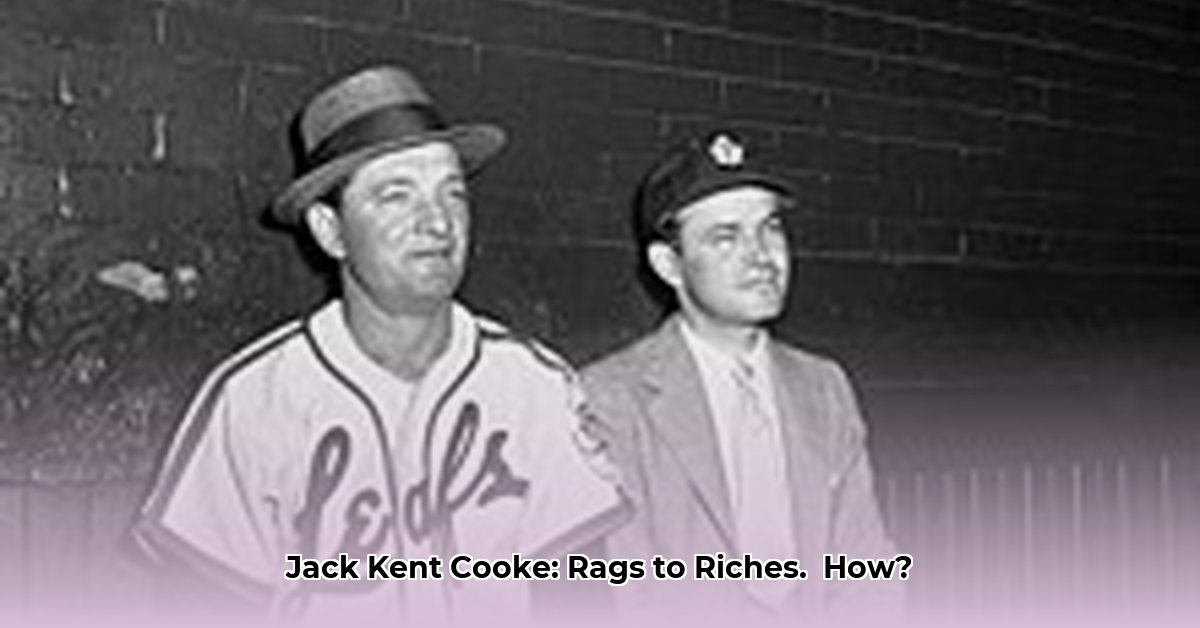
Jack Kent Cooke's life story is a compelling narrative of ambition, shrewd business dealings, and immense wealth accumulation. His journey from humble beginnings to amassing an estimated $800 million fortune by his death in 1997 is a testament to his entrepreneurial spirit and strategic vision, though it's a story interwoven with complexities and controversies. This isn't simply a tale of numbers; it's a study in the multifaceted nature of success.
Cooke's Humble Beginnings and the Forging of an Empire
Cooke's early life provided a foundation for his future success. Born into modest circumstances, he learned the value of hard work and salesmanship, honing skills that proved indispensable in the cutthroat world of media and sports. This wasn't just about acquiring wealth; it instilled an innate understanding of markets and human nature—crucial ingredients in his rise to the top. He possessed an almost preternatural ability to identify undervalued assets and a relentless drive to maximize their potential. This wasn't merely luck; it was calculated risk-taking, fueled by an unwavering belief in his own abilities. How did he cultivate this almost supernatural business acumen? A question that requires deeper exploration into his early life experiences.
One could argue that his early struggles fostered a resilience that served him well later. His initial ventures in media, focusing on the acquisition and improvement of underperforming radio stations and newspapers, showcase this. He didn't just buy these assets; he strategically improved their efficiency and profitability, demonstrating a mastery of operational management that few possessed. How did Cooke manage to consistently identify undervalued assets, and what strategies did he employ to turn them into profitable enterprises?
Building a Media and Sports Powerhouse: Strategic Acquisitions and Calculated Risks
Cooke's entry into the media landscape was marked by a series of strategic acquisitions, often targeting smaller, overlooked markets. He understood the power of media – its reach, its influence, its potential to shape public opinion. This understanding extended beyond the purely financial; it was about building an empire of influence. His business acumen extended to transforming these struggling stations into profit-generating entities. This was not simply about buying and selling; Cooke understood the intricacies of audience engagement and market positioning. His approach was remarkably consistent: identify underperforming assets, acquire them at a discounted price, implement strategic improvements, and then reap the considerable rewards.
His transition into professional sports was equally audacious. Acquiring the Los Angeles Lakers, the Los Angeles Kings, and the Washington Redskins wasn't simply about owning sports teams; it was about recognizing the incredible potential of sports as an entertainment and branding phenomenon. He understood the intricacies of the sports world, recognizing the revenue-generating potential lurking within. He didn't just buy teams; he created entertainment empires, modernizing stadiums and elevating the fan experience to ultimately expand their profit-generating capacity. How did Cooke manage to restructure these franchises to such a degree? The answer likely lies in a combination of astute business management, insightful market analysis, and an understanding of the power of branding.
The Personal Side: Philanthropy and the Shadows of Controversy
Cooke's life wasn't devoid of personal complexities. High-profile divorces and substantial settlements point to a personal life far removed from the polished image of a media and sports mogul. Yet, this is intrinsically tied to understanding his wealth. These personal events undeniably impacted the management and distribution of his wealth, and, as such, are integral elements of the larger narrative. How did these personal decisions impact his business strategies? That's a topic deserving of its own comprehensive analysis. It is crucial to consider both sides: the significant philanthropy that was a significant component of his legacy and the personal controversies.
He established the Jack Kent Cooke Foundation, a major philanthropic organization dedicated to supporting education. This demonstrates a commitment to giving back and shaping a lasting legacy, clearly contrasting with the narrative of a purely self-serving businessman. However, this philanthropic side cannot be divorced from the personal complexities—the high-profile, intensely expensive divorces and their undeniable influence on his overall wealth. His personal life provides a vital counterpoint to his professional success, making his story much richer and more nuanced.
Deconstructing the Fortune: A Legacy Beyond the Numbers
While estimates place Cooke's net worth at approximately $800 million, this figure is just a snapshot, failing to capture the decades of effort, strategic risks, and calculated acquisitions that led to its accumulation. It represents not just monetary value, but also the accumulated power and influence he wielded within the media and sports industries. The true impact extends far beyond the numbers, encompassing the businesses he established, the franchises he transformed, and the indelible mark he left on both industries. His success wasn't solely about accumulating wealth; it was about building an empire.
Conclusion: A Complex Legacy
Jack Kent Cooke's story is far from a simple rags-to-riches narrative. It's a tale of calculated risks, shrewd business decisions, and a significant dose of personal drama. His success, while undeniably impressive, must be examined through a multifaceted lens. While his philanthropic endeavors stand as a testament to his capacity for generosity, evaluating his overall legacy requires a thorough analysis of both his professional achievements and the personal complexities that shaped his life. It is the intricate interplay of these factors that truly defines his remarkable, and complicated, story.